Unit 6 Do you like bananas?知识点归纳与练习(含答案)
文档属性
| 名称 | Unit 6 Do you like bananas?知识点归纳与练习(含答案) |
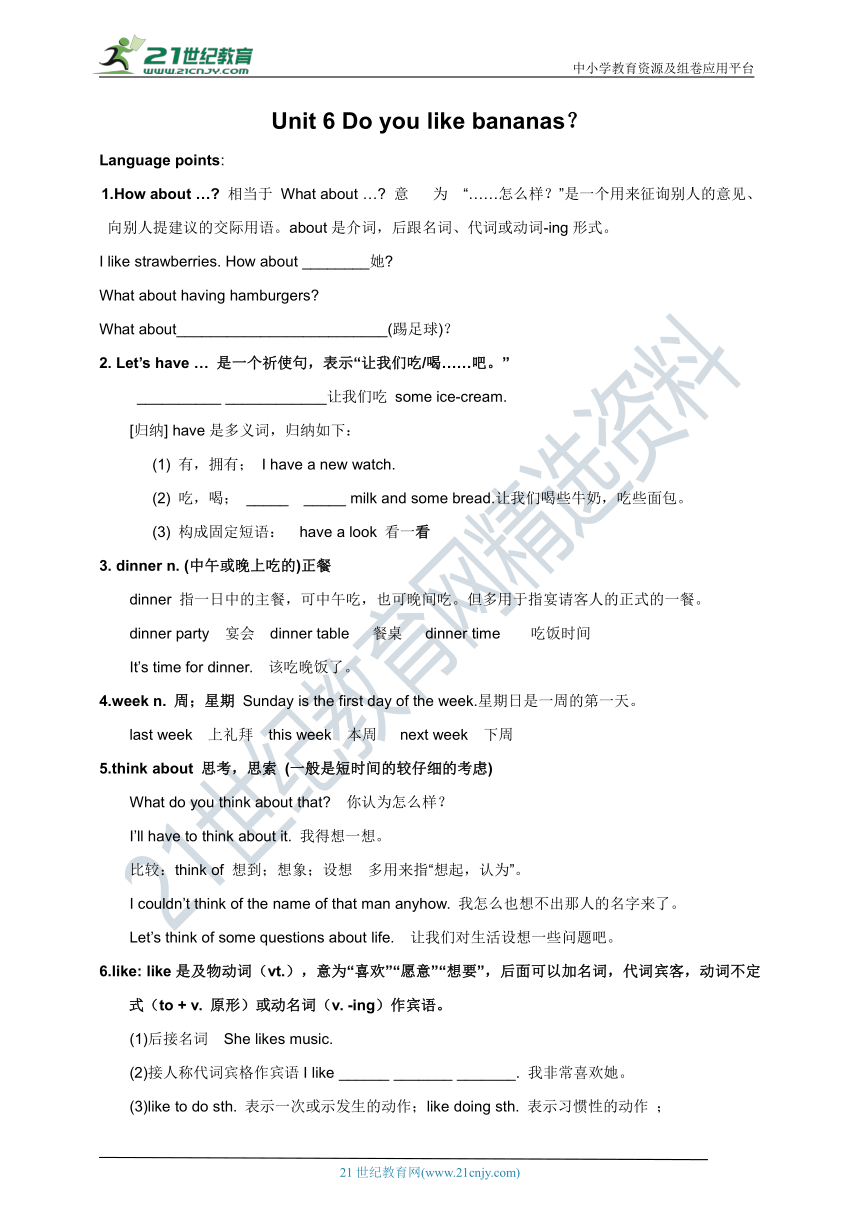
|
|
| 格式 | zip | ||
| 文件大小 | 1.3MB | ||
| 资源类型 | 试卷 | ||
| 版本资源 | 人教新目标(Go for it)版 | ||
| 科目 | 英语 | ||
| 更新时间 | 2020-10-26 00:00:00 | ||
图片预览

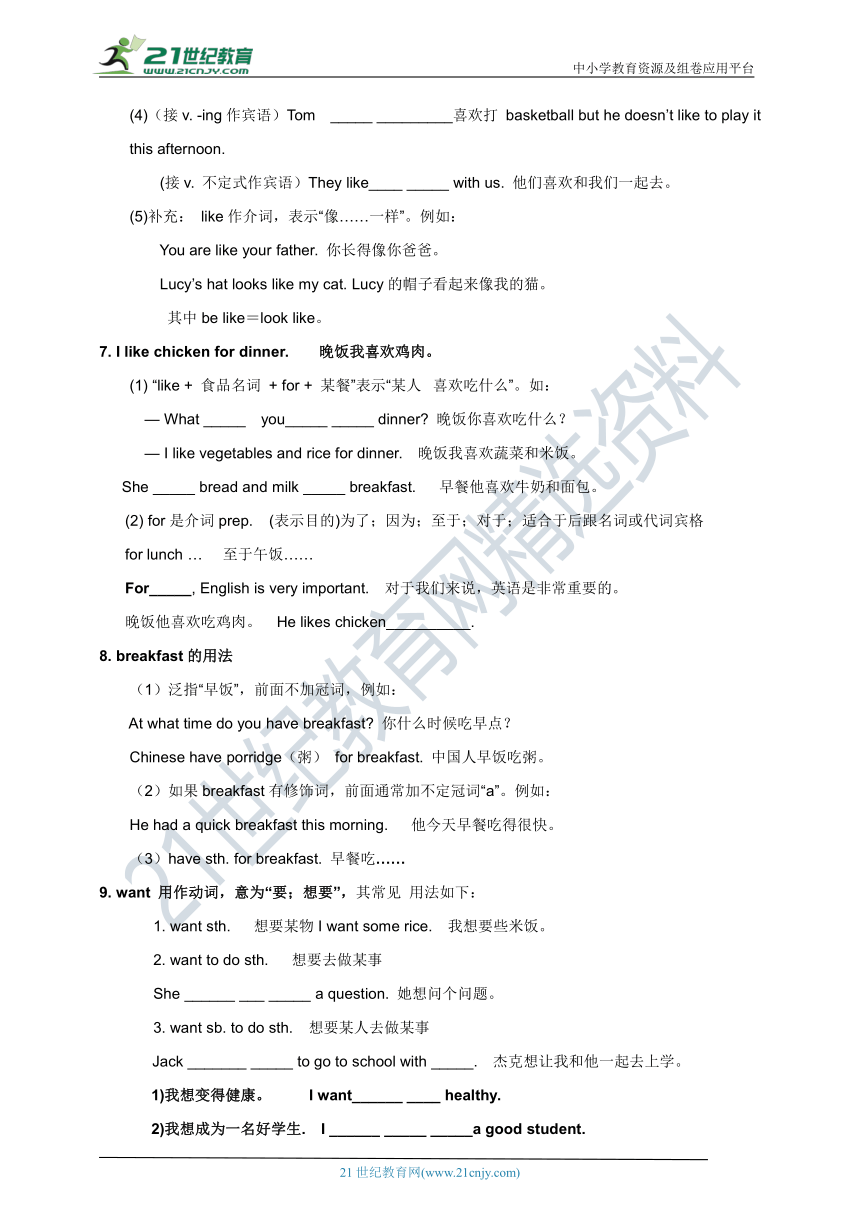
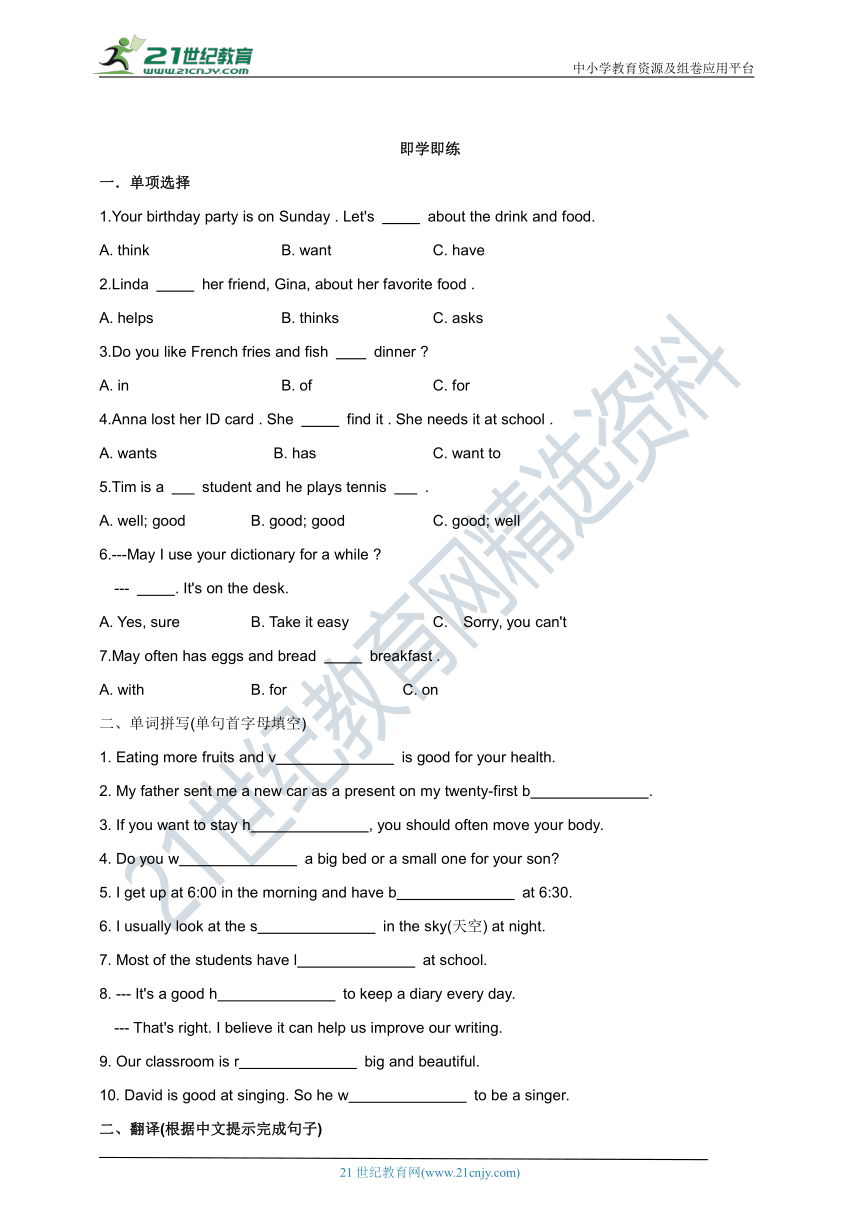
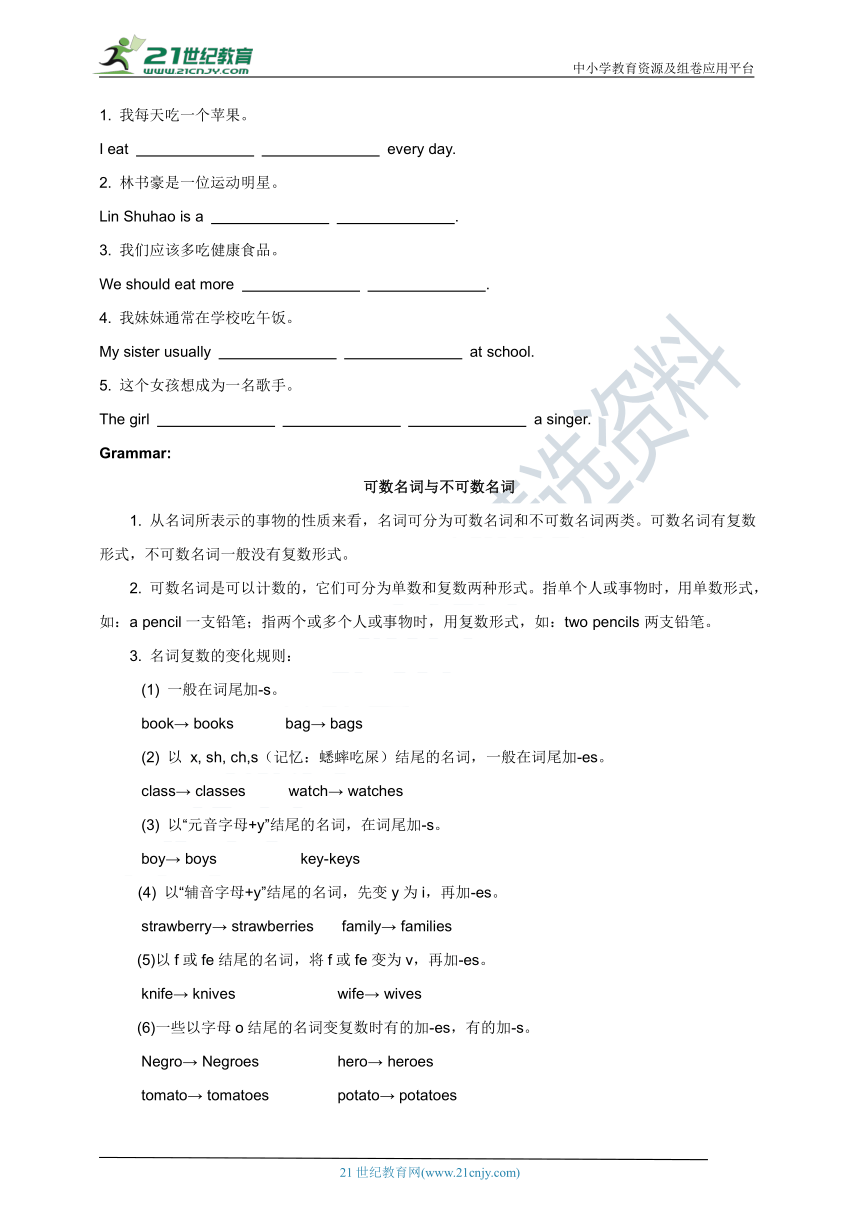
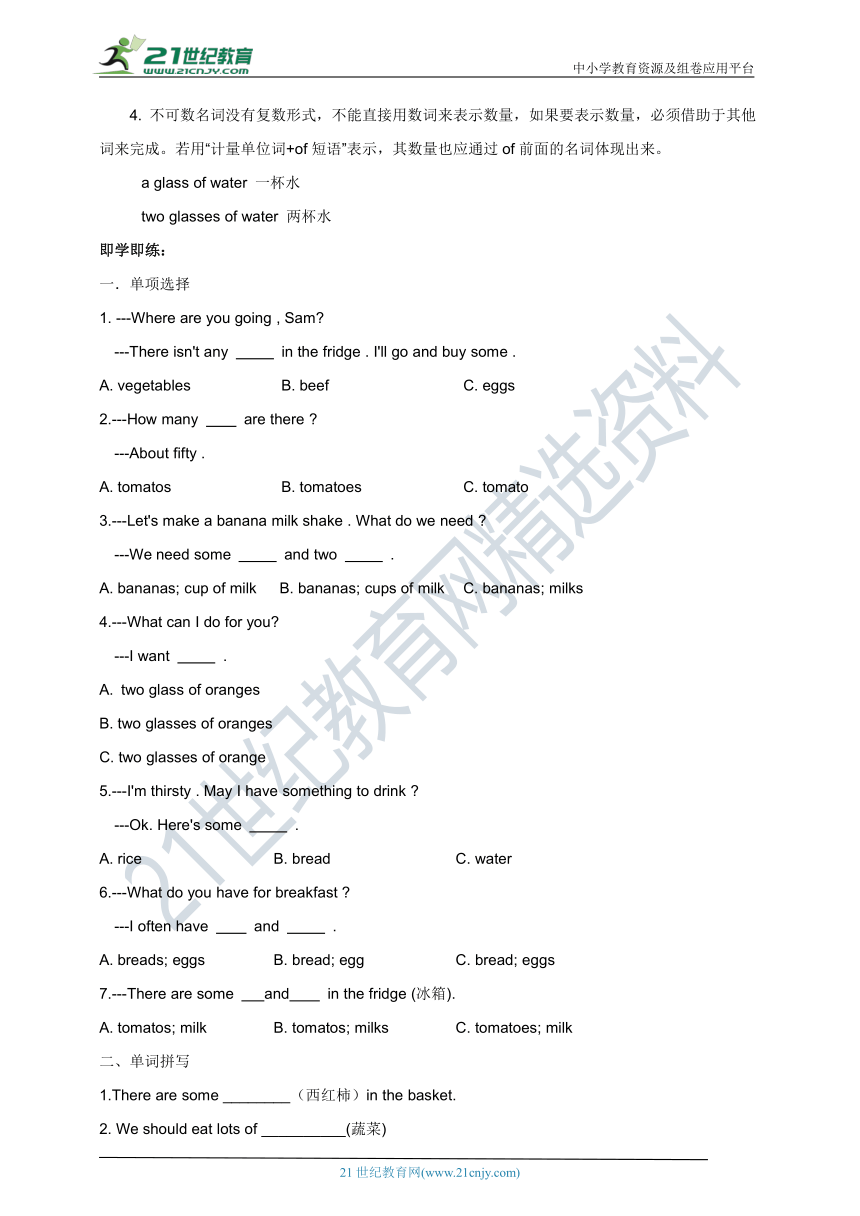
文档简介
中小学教育资源及组卷应用平台
Unit
6
Do
you
like
bananas?
Language
points:
1.How
about
…?
相当于
What
about
…?
意
为
“……怎么样?”是一个用来征询别人的意见、
向别人提建议的交际用语。about是介词,后跟名词、代词或动词-ing形式。
I
like
strawberries.
How
about
________她?
What
about
having
hamburgers?
What
about_________________________(踢足球)?
2.
Let’s
have
…
是一个祈使句,表示“让我们吃/喝……吧。”
__________
____________让我们吃
some
ice-cream.
[归纳]
have是多义词,归纳如下:
(1)
有,拥有;
I
have
a
new
watch.
(2)
吃,喝;
_____
_____
milk
and
some
bread.让我们喝些牛奶,吃些面包。
(3)
构成固定短语:
have
a
look
看一看
3.
dinner
n.
(中午或晚上吃的)正餐
dinner
指一日中的主餐,可中午吃,也可晚间吃。但多用于指宴请客人的正式的一餐。
dinner
party
宴会
dinner
table
餐桌
dinner
time
吃饭时间
It’s
time
for
dinner.
该吃晚饭了。
4.week
n.
周;星期
Sunday
is
the
first
day
of
the
week.星期日是一周的第一天。
last
week
上礼拜
this
week
本周
next
week
下周
5.think
about
思考,思索
(一般是短时间的较仔细的考虑)
What
do
you
think
about
that?
你认为怎么样?
I’ll
have
to
think
about
it.
我得想一想。
比较:think
of
想到;想象;设想
多用来指“想起,认为”。
I
couldn’t
think
of
the
name
of
that
man
anyhow.
我怎么也想不出那人的名字来了。
Let’s
think
of
some
questions
about
life.
让我们对生活设想一些问题吧。
6.like:
like是及物动词(vt.),意为“喜欢”“愿意”“想要”,后面可以加名词,代词宾客,动词不定式(to
+
v.
原形)或动名词(v.
-ing)作宾语。
(1)后接名词
She
likes
music.
(2)接人称代词宾格作宾语I
like
______
_______
_______.
我非常喜欢她。
(3)like
to
do
sth.
表示一次或示发生的动作;like
doing
sth.
表示习惯性的动作
;
(4)(接v.
-ing作宾语)Tom
_____
_________喜欢打
basketball
but
he
doesn’t
like
to
play
it
this
afternoon.
(接v.
不定式作宾语)They
like____
_____
with
us.
他们喜欢和我们一起去。
(5)补充:
like作介词,表示“像……一样”。例如:
You
are
like
your
father.
你长得像你爸爸。
Lucy’s
hat
looks
like
my
cat.
Lucy的帽子看起来像我的猫。
其中be
like=look
like。
7.
I
like
chicken
for
dinner.
晚饭我喜欢鸡肉。
(1)
“like
+
食品名词
+
for
+
某餐”表示“某人
喜欢吃什么”。如:
—
What
_____
you_____
_____
dinner?
晚饭你喜欢吃什么?
—
I
like
vegetables
and
rice
for
dinner.
晚饭我喜欢蔬菜和米饭。
She
_____
bread
and
milk
_____
breakfast.
早餐他喜欢牛奶和面包。
(2)
for是介词prep.
??(表示目的)为了;因为;至于;对于;适合于后跟名词或代词宾格
for
lunch?…
???至于午饭……
For_____,
English
is
very
important.
对于我们来说,英语是非常重要的。
晚饭他喜欢吃鸡肉。
He
likes
chicken__________.
8.
breakfast的用法
(1)泛指“早饭”,前面不加冠词,例如:
At
what
time
do
you
have
breakfast?
你什么时候吃早点?
Chinese
have
porridge(粥)
for
breakfast.
中国人早饭吃粥。
(2)如果breakfast有修饰词,前面通常加不定冠词“a”。例如:
He
had
a
quick
breakfast
this
morning.
他今天早餐吃得很快。
(3)have
sth.
for
breakfast.
早餐吃……
9.
want
用作动词,意为“要;想要”,其常见
用法如下:
1.
want
sth.
想要某物I
want
some
rice.
我想要些米饭。
2.
want
to
do
sth.
想要去做某事
She
______
___
_____
a
question.
她想问个问题。
3.
want
sb.
to
do
sth.
想要某人去做某事
Jack
_______
_____
to
go
to
school
with
_____.
杰克想让我和他一起去上学。
1)我想变得健康。
I
want______
____
healthy.
2)我想成为一名好学生.
I
______
_____
_____a
good
student.
即学即练
一.单项选择
1.Your
birthday
party
is
on
Sunday
.
Let's
about
the
drink
and
food.
A.
think
B.
want
C.
have
2.Linda
her
friend,
Gina,
about
her
favorite
food
.
A.
helps
B.
thinks
C.
asks
3.Do
you
like
French
fries
and
fish
dinner
?
A.
in
B.
of
C.
for
4.Anna
lost
her
ID
card
.
She
find
it
.
She
needs
it
at
school
.
A.
wants
B.
has
C.
want
to
5.Tim
is
a
student
and
he
plays
tennis
.
A.
well;
good
B.
good;
good
C.
good;
well
6.---May
I
use
your
dictionary
for
a
while
?
---
.
It's
on
the
desk.
A.
Yes,
sure
B.
Take
it
easy
C.
Sorry,
you
can't
7.May
often
has
eggs
and
bread
breakfast
.
A.
with
B.
for
C.
on
二、单词拼写(单句首字母填空)
1.
Eating
more
fruits
and
v
?
is
good
for
your
health.
2.
My
father
sent
me
a
new
car
as
a
present
on
my
twenty-first
b
?.
3.
If
you
want
to
stay
h
?,
you
should
often
move
your
body.
4.
Do
you
w
?
a
big
bed
or
a
small
one
for
your
son?
5.
I
get
up
at
6:00
in
the
morning
and
have
b
?
at
6:30.
6.
I
usually
look
at
the
s
?
in
the
sky(天空)
at
night.
7.
Most
of
the
students
have
l
?
at
school.
8.
---
It's
a
good
h
?
to
keep
a
diary
every
day.
---
That's
right.
I
believe
it
can
help
us
improve
our
writing.
9.
Our
classroom
is
r
?
big
and
beautiful.
10.
David
is
good
at
singing.
So
he
w
?
to
be
a
singer.
二、翻译(根据中文提示完成句子)
1.
我每天吃一个苹果。
I
eat
?
?
every
day.
2.
林书豪是一位运动明星。
Lin
Shuhao
is
a
?
?.
3.
我们应该多吃健康食品。
We
should
eat
more
?
?.
4.
我妹妹通常在学校吃午饭。
My
sister
usually
?
?
at
school.
5.
这个女孩想成为一名歌手。
The
girl
?
?
?
a
singer.
Grammar:
可数名词与不可数名词
?
1.
从名词所表示的事物的性质来看,名词可分为可数名词和不可数名词两类。可数名词有复数形式,不可数名词一般没有复数形式。
2.
可数名词是可以计数的,它们可分为单数和复数两种形式。指单个人或事物时,用单数形式,如:a
pencil一支铅笔;指两个或多个人或事物时,用复数形式,如:two
pencils?两支铅笔。
3.
名词复数的变化规则:
?
(1)
一般在词尾加-s。
?
book→
books?????
bag→
bags
?
(2)
以
x,
sh,
ch,s(记忆:蟋蟀吃屎)结尾的名词,一般在词尾加-es。
?
class→
classes??
?
watch→
watches
?
(3)
以“元音字母+y”结尾的名词,在词尾加-s。
?
boy→
boys
key-keys
??(4)
以“辅音字母+y”结尾的名词,先变y为i,再加-es。
?
strawberry→
strawberries???
family→
families
(5)以f或fe结尾的名词,将f或fe变为v,再加-es。
?
knife→
knives????????
wife→
wives
(6)一些以字母o结尾的名词变复数时有的加-es,有的加-s。
?
Negro→
Negroes
?
?
?
?
?
?
hero→
heroes
?
tomato→
tomatoes?????????
potato→
potatoes
4.
不可数名词没有复数形式,不能直接用数词来表示数量,如果要表示数量,必须借助于其他词来完成。若用“计量单位词+of短语”表示,其数量也应通过of前面的名词体现出来。
?
a
glass
of
water
一杯水
?
two
glasses
of
water
两杯水
即学即练:
一.单项选择
1.
---Where
are
you
going
,
Sam?
---There
isn't
any
in
the
fridge
.
I'll
go
and
buy
some
.
A.
vegetables
B.
beef
C.
eggs
2.---How
many
are
there
?
---About
fifty
.
A.
tomatos
B.
tomatoes
C.
tomato
3.---Let's
make
a
banana
milk
shake
.
What
do
we
need
?
---We
need
some
and
two
.
A.
bananas;
cup
of
milk
B.
bananas;
cups
of
milk
C.
bananas;
milks
4.---What
can
I
do
for
you?
---I
want
.
two
glass
of
oranges
B.
two
glasses
of
oranges
C.
two
glasses
of
orange
5.---I'm
thirsty
.
May
I
have
something
to
drink
?
---Ok.
Here's
some
.
A.
rice
B.
bread
C.
water
6.---What
do
you
have
for
breakfast
?
---I
often
have
and
.
A.
breads;
eggs
B.
bread;
egg
C.
bread;
eggs
7.---There
are
some
and
in
the
fridge
(冰箱).
A.
tomatos;
milk
B.
tomatos;
milks
C.
tomatoes;
milk
二、单词拼写
1.There
are
some
________(西红柿)in
the
basket.
2.
We
should
eat
lots
of
__________(蔬菜)
3.
The
little
girl
likes
_____________(草莓)a
lot.
4.
I
like
f__________,
for
example(例如):
apples,
bananas
and
oranges.2
5.
Give
him
two
____________.
(汉堡)
答案:1.tomatoes
2.vegetables
3.strawberries
4.fruit
5.hamburgers
三、翻译(根据中文提示完成句子)
1.水果和蔬菜是健康食品。
______
and
______
are
healthy
food.
2.我妹妹喜欢橙子、苹果和梨。
My
sister
______oranges,______
and
pears.
3.科比和乔丹是篮球明星。
Kobe
and
Jordan
are
______
______.
基础演练
一、单项选择
1.
I
like
bananas,
but
I
?
like
apples.
A.
do
B.
does
C.
don't
2.
My
favorite
?
is
?.
A.
fruit;
bread
B.
vegetable;
carrots
C.
sport;
eggs
3.
Linda
wants
?
games
with
her
friends.
A.
play
B.
plays
C.
to
play
4.
One
of
them
?
playing
football.
A.
don't
like
B.
doesn't
like
C.
isn't
like
5.
---
I
like
oranges.
??
---
I
like
apples.
A.
Are
these
oranges
B.
Do
you
like
apples
C.
What
about
you
6.
I
have
?
apple
and
my
sister
has
?
rice
every
evening.
A.
an;
a
B.
a;
a
C.
a;
/
7.
Cindy,
what
do
you
like
?
lunch?
A.
on
B.
in
C.
for
8.
Look!
Some
ice-cream
?
on
the
table.
A.
am
B.
is
C.
are
9.
I
don't
like
hamburgers,
because
?.
A.
they
are
boring
B.
they
aren't
boring
C.
they
aren't
healthy
D.
they
aren't
healthy
10.
Mary,
please
get
some
?
for
me.
A.
milk
B.
apple
C.
tomato
二、完形填空
My
name
is
Sandra.
I
have
a
brother.
1
?
name
is
Tom.
We
like
different(不同的)
sports.
I
like
playing
2
?.
It
is
fun.
I
like
tennis,
too.
3
?
I
don't
like
basketball.
It
is
4
?.
My
brother
5
?
basketball.
He
has
four
basketballs.
He
6
?
basketball
every
day.
We
like
different
7
?.
I
like
eggs,
apples
and
hamburgers
8
?
breakfast
and
dinner.
For
dessert,
I
like
9
?.
Tom
likes
oranges,
chicken
and
carrots.
We
are
10
?
because(因为)
we
often
play
sports
and
eat
good
food.
1.
A.
He
B.
She
C.
His
2.
A.
volleyball
B.
basketball
C.
the
piano
3.
A.
And
B.
With
C.
But
4.
A.
fun
B.
difficult
C.
interesting
5.
A.
likes
B.
don't
like
C.
like
6.
A.
looks
B.
knows
C.
plays
7.
A.
food
B.
books
C.
colors
8.
A.
in
B.
on
C.
for
9.
A.
hamburgers
B.
chicken
C.
ice
cream
10.
A.
boring
B.
healthy
C.
great
三、阅读理解
A
What
do
you
eat
every
day?
Do
you
eat
well?
You
need
lots
of
fruit.
You
don't
need
lots
of
dessert(甜点).
You
need
many
vegetables,
but
you
don't
need
many
hamburgers.
You
need
some
chicken
and
eggs,
but
you
don't
need
many
French
fries(炸薯条).
Hi!
I'm
Mary.
I
like
hamburgers,
French
fries,
chicken
and
ice-cream.
I
eat
lots
of
them.
I
don't
like
eggs,
fruit
or
vegetables.
I
don't
eat
eggs,
apples,
bananas,
carrots
or
tomatoes.
Hi!
I'm
Nick.
I
like
oranges,
apples,
bananas,
carrots,
tomatoes
and
salad.
I
eat
lots
of
them.
I
like
chicken
and
eggs,
too.
And
I
eat
some
of
them.
I
don'
t
like
ice-cream
or
French
fries.
I
don't
eat
them.
I'm
healthy.
Healthy
food
is
good
for
us.
Do
you
think
so?
1.
Mary
doesn't
eat
?.
A.
French
fries
B.
Ice
cream
C.
eggs
2.
Nick
doesn't
like
?.
A.
chicken
B.
eggs
C.
bananas
.
3.
Does
Mary
eat
bananas
every
day?
A.
Yes,
she
does.
B.
No,
she
does.
C.
No,
she
doesn't.
D.
Yes,
she
eats.
4.
What
vegetables
does
Nick
like?
A.
Pears.
B.
Bananas.
C.
Oranges.
5.
We
need
to
eat
?.
A.
many
hamburgers
B.
many
French
fries
C.
fruit
and
vegetables
B
Every
country
has
its
favorite
food.
Italians
like
to
eat
pizza(比萨).
Indians
like
to
eat
hot
food.
Japanese
like
to
eat
fish.
Often
they
don't
cook
it.
The
English's
favorite
food
is
fish
and
chips.
They
often
get
them
in
the
shop
and
take
them
home
or
eat
them
in
the
park.
The
American's
favorite
food
is
fast
food,
but
it
is
not
good
for
health.
6.
?
like
to
eat
pizza.
A.
Chinese
B.
Americans
C.
English
7.
Japanese
like
to
eat
?.
A.
pizza
B.
hot
food
C.
fish
8.
Li
Yun
is
from
China.
She
likes
to
eat
?.
A.
hot
food
B.
fast
food
C.
vegetables
9.
The
people
in
?
often
buy
fish
and
chips.
A.
the
USA
B.
England
C.
China
I
10.
?
isn't
healthy
food.
A.
Fast
food
B.
Hot
food
C.
Pizza
四、阅读与表达(问答式)
People
in
different
parts
of
the
world
eat
different
things.
In
South
China
people
eat
rice
every
day.
Sometimes
they
eat
it
two
or
three
times
a
day,
for
breakfast,
lunch
and
supper.
And
people
usually
eat
rice
with
fish,
meat
and
vegetables.
The
Japanese
eat
rice,
too.
They
also
eat
a
lot
of
fish
because
they
live
near
the
sea.
It's
easy
for
them
to
get
fish.
Sometimes,
they
eat
raw(生的)
fish.
In
western
countries
such
as
Britain,
Australia
and
the
USA,
the
most
important
food
is
bread
and
potatoes.
People
there
can
cook
potatoes
in
many
different
ways.
In
Britain
the
most
popular
food
is
fish
and
chips.
Sometimes
people
cook
this
kind
of
food
at
home,
but
they
usually
buy
it
at
the
shop.
They
eat
it
at
home,
in
their
workplace,
in
the
park
or
even
on
the
road.
People
call
it
"take-away"
food.
根据短文内容,完成下列小题。
1.
What
do
people
in
South
China
eat
every
day
according
to
this
passage?
?
2.
Do
the
Japanese
eat
rice?
?
3.
What
is
the
most
important
food
in
western
countries?
?
4.
Where
do
people
in
western
countries
eat
"take-away"
food?
?
5.
What
does
the
passage
mainly(主要地)
tell
us?
?
五、选词填空(短文选词填空)
breakfast
healthy
glasses
or(或者)
do
has
in
doesn't
like
plays
watching
Rick
is
a
fat
man.
He
gets
up
late(晚)1.
?
the
morning.
He
has
2.
?
every
morning.
He
has
some
meat(肉),
three
3.
?
four
eggs
and
some
pieces
of
bread(面包).
He
drinks
two4.
?
of
milk,
some
apple
juice,
a
cup
of
coffee
and
eats
some
fruit.
His
wife,
Vicky,
5.
?
a
cup
of
tea,
a
piece
of
bread
and
a
banana
for
breakfast.
Rick
6.
?
any
ball
games.
He
thinks
they
are
too
difficult
for
him,
but
he
likes
listening
to
music(音乐)
and
7.
?
TV
and
he
doesn't
8.
?
any
housework(家务).
Vicky
9.
?
sports
every
day.
In
fact,
she
is
in
a
swimming
club.
So
she
is
very
10.
?.
六.情景交际
A:
Hi,
Mike!
Is
this
notebook
yours?
B:
________________________________.
My
notebook
is
on
my
desk.
It
may(可能)
be
Tom’s.
A:
________________________________?
B:
He
is
in
the
school
library.
A:
Well,
let’s
call
him.
________________________________?
B:
It’s
733-0054.
A:
Hi,
Tom!
I
found
a
notebook
on
the
teacher’s
desk.
Is
it
yours?
C:
________________________________?
A:
It’s
blue.
C:
Oh,
I
put
it
there.
It’s
mine.
Thanks.
A:
________________________________.
Unit
6
Do
you
like
bananas?参考答案
即学即练
一.解析及答案:
1.
think
about是固定词组,意思是“考虑”,故选A。
2.
句意:琳达询问她的朋友吉娜关于她最喜爱的食物。ask
sb.
about
sth.
向某人打听某事。about表示“关于”,用来解释说明(问的)是哪方面的问题。故选C。
3.
like...for
breakfast/lunch/dinner是固定搭配,意思是“早/午/晚饭喜欢吃......”。故选C。
4.
want
to
do
sth.意思是“想做某事”。故选C。
5.
第一个空作定语,修饰名词student,
应该用形容词good;第二空格处需要一个副词,做状语,修饰动词play,要用well。
故选C。
6.
Yes,
sure是“好的,当然可以”;B.
Take
it
easy是“别着急”;C.
You've
got
it“你已经知道了”C.
Sorry,
you
can't“对不起,你不能”。根据句意可知,故选A。
7.
have
sth.
for
breakfast
意为“早餐吃......”。故选B。
二.答案:
1.
vegetables
2.
birthday
3.
healthy
4.
want
5.
breakfast
6.
stars
7.
lunch
8.
habit
9.
really
10.
wants
三.答案:
1.
an
apple
2.
sports
star
3.
healthy
food
4.
has/eats
lunch
5.
wants
to
be
即学即练
一.解析及答案:
1.
根据答语中的isn't可知,设空处的名词一定是单数名词或不可数名词。故选B。
2.
how
many后用可数名词的复数形式。tomato的复数是
tomatoes,故选B。
3.
milk为可数名词,没有复数形式,由第二空前的
two可知,cup应用复数cups
。故选B。
4.
orange作可数名词,意为“橙子”其复数形式为oranges;orange作比可数名词,意为“橙汁”,需用“数词+表示容器等的名词+of+不可数名词”结构来表达数量,故选C。
5.
上句句意“我渴了,我可以喝点东西吗?”rice和
bread是食物,故只有water符合题意,故选C。
6.
bread为不可数名词,没有复数形式,而egg为可数名词,在句中应变为复数,故选。
7.
句意:冰箱里有一些西红柿和牛奶。some表示“一些”修饰复数名词或不可数名词。tomato为可数名词,复数为tomatoes;
milk为不可数名词。故选C。
二.答案:1.tomatoes
2.vegetables
3.strawberries
4.fruit
5.hamburgers
三.答案:1.
Fruit;vegetables
2.
likes;apples
3.
basketball
stars
基础演练
一、单项选择
1-5
CBCBC
6-10
DCBCA
二、完形填空
1-5
CACBA
6-10
CACCB
三、阅读理解
1-5
CCCCC
6-10
CCCBA
四、阅读与表达(问答式)
1.
Rice.
/
They
eat
rice.
2.
Yes.
/
Yes,
they
do.
3.
Bread
and
potatoes.
4.
They
eat
it
at
home,
in
their
workplace,
in
the
park
or
even
on
the
road.
5.
People
in
different
parts
of
the
world
eat
different
things.
五、选词填空(短文选词填空)
1.
in
2.
breakfast
3.
or
4.
glasses
5.
has
6.
doesn't
like
7.
watching
8.
do
9.
plays
10.
healthy
六.情景交际
No,
it
isn’t.
Where
is
Tom?
What’s
his
phone
number?
What
color
is
it?
You’re
welcome.
21世纪教育网
www.21cnjy.com
精品试卷·第
2
页
(共
2
页)
HYPERLINK
"http://21世纪教育网(www.21cnjy.com)
"
21世纪教育网(www.21cnjy.com)
Unit
6
Do
you
like
bananas?
Language
points:
1.How
about
…?
相当于
What
about
…?
意
为
“……怎么样?”是一个用来征询别人的意见、
向别人提建议的交际用语。about是介词,后跟名词、代词或动词-ing形式。
I
like
strawberries.
How
about
________她?
What
about
having
hamburgers?
What
about_________________________(踢足球)?
2.
Let’s
have
…
是一个祈使句,表示“让我们吃/喝……吧。”
__________
____________让我们吃
some
ice-cream.
[归纳]
have是多义词,归纳如下:
(1)
有,拥有;
I
have
a
new
watch.
(2)
吃,喝;
_____
_____
milk
and
some
bread.让我们喝些牛奶,吃些面包。
(3)
构成固定短语:
have
a
look
看一看
3.
dinner
n.
(中午或晚上吃的)正餐
dinner
指一日中的主餐,可中午吃,也可晚间吃。但多用于指宴请客人的正式的一餐。
dinner
party
宴会
dinner
table
餐桌
dinner
time
吃饭时间
It’s
time
for
dinner.
该吃晚饭了。
4.week
n.
周;星期
Sunday
is
the
first
day
of
the
week.星期日是一周的第一天。
last
week
上礼拜
this
week
本周
next
week
下周
5.think
about
思考,思索
(一般是短时间的较仔细的考虑)
What
do
you
think
about
that?
你认为怎么样?
I’ll
have
to
think
about
it.
我得想一想。
比较:think
of
想到;想象;设想
多用来指“想起,认为”。
I
couldn’t
think
of
the
name
of
that
man
anyhow.
我怎么也想不出那人的名字来了。
Let’s
think
of
some
questions
about
life.
让我们对生活设想一些问题吧。
6.like:
like是及物动词(vt.),意为“喜欢”“愿意”“想要”,后面可以加名词,代词宾客,动词不定式(to
+
v.
原形)或动名词(v.
-ing)作宾语。
(1)后接名词
She
likes
music.
(2)接人称代词宾格作宾语I
like
______
_______
_______.
我非常喜欢她。
(3)like
to
do
sth.
表示一次或示发生的动作;like
doing
sth.
表示习惯性的动作
;
(4)(接v.
-ing作宾语)Tom
_____
_________喜欢打
basketball
but
he
doesn’t
like
to
play
it
this
afternoon.
(接v.
不定式作宾语)They
like____
_____
with
us.
他们喜欢和我们一起去。
(5)补充:
like作介词,表示“像……一样”。例如:
You
are
like
your
father.
你长得像你爸爸。
Lucy’s
hat
looks
like
my
cat.
Lucy的帽子看起来像我的猫。
其中be
like=look
like。
7.
I
like
chicken
for
dinner.
晚饭我喜欢鸡肉。
(1)
“like
+
食品名词
+
for
+
某餐”表示“某人
喜欢吃什么”。如:
—
What
_____
you_____
_____
dinner?
晚饭你喜欢吃什么?
—
I
like
vegetables
and
rice
for
dinner.
晚饭我喜欢蔬菜和米饭。
She
_____
bread
and
milk
_____
breakfast.
早餐他喜欢牛奶和面包。
(2)
for是介词prep.
??(表示目的)为了;因为;至于;对于;适合于后跟名词或代词宾格
for
lunch?…
???至于午饭……
For_____,
English
is
very
important.
对于我们来说,英语是非常重要的。
晚饭他喜欢吃鸡肉。
He
likes
chicken__________.
8.
breakfast的用法
(1)泛指“早饭”,前面不加冠词,例如:
At
what
time
do
you
have
breakfast?
你什么时候吃早点?
Chinese
have
porridge(粥)
for
breakfast.
中国人早饭吃粥。
(2)如果breakfast有修饰词,前面通常加不定冠词“a”。例如:
He
had
a
quick
breakfast
this
morning.
他今天早餐吃得很快。
(3)have
sth.
for
breakfast.
早餐吃……
9.
want
用作动词,意为“要;想要”,其常见
用法如下:
1.
want
sth.
想要某物I
want
some
rice.
我想要些米饭。
2.
want
to
do
sth.
想要去做某事
She
______
___
_____
a
question.
她想问个问题。
3.
want
sb.
to
do
sth.
想要某人去做某事
Jack
_______
_____
to
go
to
school
with
_____.
杰克想让我和他一起去上学。
1)我想变得健康。
I
want______
____
healthy.
2)我想成为一名好学生.
I
______
_____
_____a
good
student.
即学即练
一.单项选择
1.Your
birthday
party
is
on
Sunday
.
Let's
about
the
drink
and
food.
A.
think
B.
want
C.
have
2.Linda
her
friend,
Gina,
about
her
favorite
food
.
A.
helps
B.
thinks
C.
asks
3.Do
you
like
French
fries
and
fish
dinner
?
A.
in
B.
of
C.
for
4.Anna
lost
her
ID
card
.
She
find
it
.
She
needs
it
at
school
.
A.
wants
B.
has
C.
want
to
5.Tim
is
a
student
and
he
plays
tennis
.
A.
well;
good
B.
good;
good
C.
good;
well
6.---May
I
use
your
dictionary
for
a
while
?
---
.
It's
on
the
desk.
A.
Yes,
sure
B.
Take
it
easy
C.
Sorry,
you
can't
7.May
often
has
eggs
and
bread
breakfast
.
A.
with
B.
for
C.
on
二、单词拼写(单句首字母填空)
1.
Eating
more
fruits
and
v
?
is
good
for
your
health.
2.
My
father
sent
me
a
new
car
as
a
present
on
my
twenty-first
b
?.
3.
If
you
want
to
stay
h
?,
you
should
often
move
your
body.
4.
Do
you
w
?
a
big
bed
or
a
small
one
for
your
son?
5.
I
get
up
at
6:00
in
the
morning
and
have
b
?
at
6:30.
6.
I
usually
look
at
the
s
?
in
the
sky(天空)
at
night.
7.
Most
of
the
students
have
l
?
at
school.
8.
---
It's
a
good
h
?
to
keep
a
diary
every
day.
---
That's
right.
I
believe
it
can
help
us
improve
our
writing.
9.
Our
classroom
is
r
?
big
and
beautiful.
10.
David
is
good
at
singing.
So
he
w
?
to
be
a
singer.
二、翻译(根据中文提示完成句子)
1.
我每天吃一个苹果。
I
eat
?
?
every
day.
2.
林书豪是一位运动明星。
Lin
Shuhao
is
a
?
?.
3.
我们应该多吃健康食品。
We
should
eat
more
?
?.
4.
我妹妹通常在学校吃午饭。
My
sister
usually
?
?
at
school.
5.
这个女孩想成为一名歌手。
The
girl
?
?
?
a
singer.
Grammar:
可数名词与不可数名词
?
1.
从名词所表示的事物的性质来看,名词可分为可数名词和不可数名词两类。可数名词有复数形式,不可数名词一般没有复数形式。
2.
可数名词是可以计数的,它们可分为单数和复数两种形式。指单个人或事物时,用单数形式,如:a
pencil一支铅笔;指两个或多个人或事物时,用复数形式,如:two
pencils?两支铅笔。
3.
名词复数的变化规则:
?
(1)
一般在词尾加-s。
?
book→
books?????
bag→
bags
?
(2)
以
x,
sh,
ch,s(记忆:蟋蟀吃屎)结尾的名词,一般在词尾加-es。
?
class→
classes??
?
watch→
watches
?
(3)
以“元音字母+y”结尾的名词,在词尾加-s。
?
boy→
boys
key-keys
??(4)
以“辅音字母+y”结尾的名词,先变y为i,再加-es。
?
strawberry→
strawberries???
family→
families
(5)以f或fe结尾的名词,将f或fe变为v,再加-es。
?
knife→
knives????????
wife→
wives
(6)一些以字母o结尾的名词变复数时有的加-es,有的加-s。
?
Negro→
Negroes
?
?
?
?
?
?
hero→
heroes
?
tomato→
tomatoes?????????
potato→
potatoes
4.
不可数名词没有复数形式,不能直接用数词来表示数量,如果要表示数量,必须借助于其他词来完成。若用“计量单位词+of短语”表示,其数量也应通过of前面的名词体现出来。
?
a
glass
of
water
一杯水
?
two
glasses
of
water
两杯水
即学即练:
一.单项选择
1.
---Where
are
you
going
,
Sam?
---There
isn't
any
in
the
fridge
.
I'll
go
and
buy
some
.
A.
vegetables
B.
beef
C.
eggs
2.---How
many
are
there
?
---About
fifty
.
A.
tomatos
B.
tomatoes
C.
tomato
3.---Let's
make
a
banana
milk
shake
.
What
do
we
need
?
---We
need
some
and
two
.
A.
bananas;
cup
of
milk
B.
bananas;
cups
of
milk
C.
bananas;
milks
4.---What
can
I
do
for
you?
---I
want
.
two
glass
of
oranges
B.
two
glasses
of
oranges
C.
two
glasses
of
orange
5.---I'm
thirsty
.
May
I
have
something
to
drink
?
---Ok.
Here's
some
.
A.
rice
B.
bread
C.
water
6.---What
do
you
have
for
breakfast
?
---I
often
have
and
.
A.
breads;
eggs
B.
bread;
egg
C.
bread;
eggs
7.---There
are
some
and
in
the
fridge
(冰箱).
A.
tomatos;
milk
B.
tomatos;
milks
C.
tomatoes;
milk
二、单词拼写
1.There
are
some
________(西红柿)in
the
basket.
2.
We
should
eat
lots
of
__________(蔬菜)
3.
The
little
girl
likes
_____________(草莓)a
lot.
4.
I
like
f__________,
for
example(例如):
apples,
bananas
and
oranges.2
5.
Give
him
two
____________.
(汉堡)
答案:1.tomatoes
2.vegetables
3.strawberries
4.fruit
5.hamburgers
三、翻译(根据中文提示完成句子)
1.水果和蔬菜是健康食品。
______
and
______
are
healthy
food.
2.我妹妹喜欢橙子、苹果和梨。
My
sister
______oranges,______
and
pears.
3.科比和乔丹是篮球明星。
Kobe
and
Jordan
are
______
______.
基础演练
一、单项选择
1.
I
like
bananas,
but
I
?
like
apples.
A.
do
B.
does
C.
don't
2.
My
favorite
?
is
?.
A.
fruit;
bread
B.
vegetable;
carrots
C.
sport;
eggs
3.
Linda
wants
?
games
with
her
friends.
A.
play
B.
plays
C.
to
play
4.
One
of
them
?
playing
football.
A.
don't
like
B.
doesn't
like
C.
isn't
like
5.
---
I
like
oranges.
??
---
I
like
apples.
A.
Are
these
oranges
B.
Do
you
like
apples
C.
What
about
you
6.
I
have
?
apple
and
my
sister
has
?
rice
every
evening.
A.
an;
a
B.
a;
a
C.
a;
/
7.
Cindy,
what
do
you
like
?
lunch?
A.
on
B.
in
C.
for
8.
Look!
Some
ice-cream
?
on
the
table.
A.
am
B.
is
C.
are
9.
I
don't
like
hamburgers,
because
?.
A.
they
are
boring
B.
they
aren't
boring
C.
they
aren't
healthy
D.
they
aren't
healthy
10.
Mary,
please
get
some
?
for
me.
A.
milk
B.
apple
C.
tomato
二、完形填空
My
name
is
Sandra.
I
have
a
brother.
1
?
name
is
Tom.
We
like
different(不同的)
sports.
I
like
playing
2
?.
It
is
fun.
I
like
tennis,
too.
3
?
I
don't
like
basketball.
It
is
4
?.
My
brother
5
?
basketball.
He
has
four
basketballs.
He
6
?
basketball
every
day.
We
like
different
7
?.
I
like
eggs,
apples
and
hamburgers
8
?
breakfast
and
dinner.
For
dessert,
I
like
9
?.
Tom
likes
oranges,
chicken
and
carrots.
We
are
10
?
because(因为)
we
often
play
sports
and
eat
good
food.
1.
A.
He
B.
She
C.
His
2.
A.
volleyball
B.
basketball
C.
the
piano
3.
A.
And
B.
With
C.
But
4.
A.
fun
B.
difficult
C.
interesting
5.
A.
likes
B.
don't
like
C.
like
6.
A.
looks
B.
knows
C.
plays
7.
A.
food
B.
books
C.
colors
8.
A.
in
B.
on
C.
for
9.
A.
hamburgers
B.
chicken
C.
ice
cream
10.
A.
boring
B.
healthy
C.
great
三、阅读理解
A
What
do
you
eat
every
day?
Do
you
eat
well?
You
need
lots
of
fruit.
You
don't
need
lots
of
dessert(甜点).
You
need
many
vegetables,
but
you
don't
need
many
hamburgers.
You
need
some
chicken
and
eggs,
but
you
don't
need
many
French
fries(炸薯条).
Hi!
I'm
Mary.
I
like
hamburgers,
French
fries,
chicken
and
ice-cream.
I
eat
lots
of
them.
I
don't
like
eggs,
fruit
or
vegetables.
I
don't
eat
eggs,
apples,
bananas,
carrots
or
tomatoes.
Hi!
I'm
Nick.
I
like
oranges,
apples,
bananas,
carrots,
tomatoes
and
salad.
I
eat
lots
of
them.
I
like
chicken
and
eggs,
too.
And
I
eat
some
of
them.
I
don'
t
like
ice-cream
or
French
fries.
I
don't
eat
them.
I'm
healthy.
Healthy
food
is
good
for
us.
Do
you
think
so?
1.
Mary
doesn't
eat
?.
A.
French
fries
B.
Ice
cream
C.
eggs
2.
Nick
doesn't
like
?.
A.
chicken
B.
eggs
C.
bananas
.
3.
Does
Mary
eat
bananas
every
day?
A.
Yes,
she
does.
B.
No,
she
does.
C.
No,
she
doesn't.
D.
Yes,
she
eats.
4.
What
vegetables
does
Nick
like?
A.
Pears.
B.
Bananas.
C.
Oranges.
5.
We
need
to
eat
?.
A.
many
hamburgers
B.
many
French
fries
C.
fruit
and
vegetables
B
Every
country
has
its
favorite
food.
Italians
like
to
eat
pizza(比萨).
Indians
like
to
eat
hot
food.
Japanese
like
to
eat
fish.
Often
they
don't
cook
it.
The
English's
favorite
food
is
fish
and
chips.
They
often
get
them
in
the
shop
and
take
them
home
or
eat
them
in
the
park.
The
American's
favorite
food
is
fast
food,
but
it
is
not
good
for
health.
6.
?
like
to
eat
pizza.
A.
Chinese
B.
Americans
C.
English
7.
Japanese
like
to
eat
?.
A.
pizza
B.
hot
food
C.
fish
8.
Li
Yun
is
from
China.
She
likes
to
eat
?.
A.
hot
food
B.
fast
food
C.
vegetables
9.
The
people
in
?
often
buy
fish
and
chips.
A.
the
USA
B.
England
C.
China
I
10.
?
isn't
healthy
food.
A.
Fast
food
B.
Hot
food
C.
Pizza
四、阅读与表达(问答式)
People
in
different
parts
of
the
world
eat
different
things.
In
South
China
people
eat
rice
every
day.
Sometimes
they
eat
it
two
or
three
times
a
day,
for
breakfast,
lunch
and
supper.
And
people
usually
eat
rice
with
fish,
meat
and
vegetables.
The
Japanese
eat
rice,
too.
They
also
eat
a
lot
of
fish
because
they
live
near
the
sea.
It's
easy
for
them
to
get
fish.
Sometimes,
they
eat
raw(生的)
fish.
In
western
countries
such
as
Britain,
Australia
and
the
USA,
the
most
important
food
is
bread
and
potatoes.
People
there
can
cook
potatoes
in
many
different
ways.
In
Britain
the
most
popular
food
is
fish
and
chips.
Sometimes
people
cook
this
kind
of
food
at
home,
but
they
usually
buy
it
at
the
shop.
They
eat
it
at
home,
in
their
workplace,
in
the
park
or
even
on
the
road.
People
call
it
"take-away"
food.
根据短文内容,完成下列小题。
1.
What
do
people
in
South
China
eat
every
day
according
to
this
passage?
?
2.
Do
the
Japanese
eat
rice?
?
3.
What
is
the
most
important
food
in
western
countries?
?
4.
Where
do
people
in
western
countries
eat
"take-away"
food?
?
5.
What
does
the
passage
mainly(主要地)
tell
us?
?
五、选词填空(短文选词填空)
breakfast
healthy
glasses
or(或者)
do
has
in
doesn't
like
plays
watching
Rick
is
a
fat
man.
He
gets
up
late(晚)1.
?
the
morning.
He
has
2.
?
every
morning.
He
has
some
meat(肉),
three
3.
?
four
eggs
and
some
pieces
of
bread(面包).
He
drinks
two4.
?
of
milk,
some
apple
juice,
a
cup
of
coffee
and
eats
some
fruit.
His
wife,
Vicky,
5.
?
a
cup
of
tea,
a
piece
of
bread
and
a
banana
for
breakfast.
Rick
6.
?
any
ball
games.
He
thinks
they
are
too
difficult
for
him,
but
he
likes
listening
to
music(音乐)
and
7.
?
TV
and
he
doesn't
8.
?
any
housework(家务).
Vicky
9.
?
sports
every
day.
In
fact,
she
is
in
a
swimming
club.
So
she
is
very
10.
?.
六.情景交际
A:
Hi,
Mike!
Is
this
notebook
yours?
B:
________________________________.
My
notebook
is
on
my
desk.
It
may(可能)
be
Tom’s.
A:
________________________________?
B:
He
is
in
the
school
library.
A:
Well,
let’s
call
him.
________________________________?
B:
It’s
733-0054.
A:
Hi,
Tom!
I
found
a
notebook
on
the
teacher’s
desk.
Is
it
yours?
C:
________________________________?
A:
It’s
blue.
C:
Oh,
I
put
it
there.
It’s
mine.
Thanks.
A:
________________________________.
Unit
6
Do
you
like
bananas?参考答案
即学即练
一.解析及答案:
1.
think
about是固定词组,意思是“考虑”,故选A。
2.
句意:琳达询问她的朋友吉娜关于她最喜爱的食物。ask
sb.
about
sth.
向某人打听某事。about表示“关于”,用来解释说明(问的)是哪方面的问题。故选C。
3.
like...for
breakfast/lunch/dinner是固定搭配,意思是“早/午/晚饭喜欢吃......”。故选C。
4.
want
to
do
sth.意思是“想做某事”。故选C。
5.
第一个空作定语,修饰名词student,
应该用形容词good;第二空格处需要一个副词,做状语,修饰动词play,要用well。
故选C。
6.
Yes,
sure是“好的,当然可以”;B.
Take
it
easy是“别着急”;C.
You've
got
it“你已经知道了”C.
Sorry,
you
can't“对不起,你不能”。根据句意可知,故选A。
7.
have
sth.
for
breakfast
意为“早餐吃......”。故选B。
二.答案:
1.
vegetables
2.
birthday
3.
healthy
4.
want
5.
breakfast
6.
stars
7.
lunch
8.
habit
9.
really
10.
wants
三.答案:
1.
an
apple
2.
sports
star
3.
healthy
food
4.
has/eats
lunch
5.
wants
to
be
即学即练
一.解析及答案:
1.
根据答语中的isn't可知,设空处的名词一定是单数名词或不可数名词。故选B。
2.
how
many后用可数名词的复数形式。tomato的复数是
tomatoes,故选B。
3.
milk为可数名词,没有复数形式,由第二空前的
two可知,cup应用复数cups
。故选B。
4.
orange作可数名词,意为“橙子”其复数形式为oranges;orange作比可数名词,意为“橙汁”,需用“数词+表示容器等的名词+of+不可数名词”结构来表达数量,故选C。
5.
上句句意“我渴了,我可以喝点东西吗?”rice和
bread是食物,故只有water符合题意,故选C。
6.
bread为不可数名词,没有复数形式,而egg为可数名词,在句中应变为复数,故选。
7.
句意:冰箱里有一些西红柿和牛奶。some表示“一些”修饰复数名词或不可数名词。tomato为可数名词,复数为tomatoes;
milk为不可数名词。故选C。
二.答案:1.tomatoes
2.vegetables
3.strawberries
4.fruit
5.hamburgers
三.答案:1.
Fruit;vegetables
2.
likes;apples
3.
basketball
stars
基础演练
一、单项选择
1-5
CBCBC
6-10
DCBCA
二、完形填空
1-5
CACBA
6-10
CACCB
三、阅读理解
1-5
CCCCC
6-10
CCCBA
四、阅读与表达(问答式)
1.
Rice.
/
They
eat
rice.
2.
Yes.
/
Yes,
they
do.
3.
Bread
and
potatoes.
4.
They
eat
it
at
home,
in
their
workplace,
in
the
park
or
even
on
the
road.
5.
People
in
different
parts
of
the
world
eat
different
things.
五、选词填空(短文选词填空)
1.
in
2.
breakfast
3.
or
4.
glasses
5.
has
6.
doesn't
like
7.
watching
8.
do
9.
plays
10.
healthy
六.情景交际
No,
it
isn’t.
Where
is
Tom?
What’s
his
phone
number?
What
color
is
it?
You’re
welcome.
21世纪教育网
www.21cnjy.com
精品试卷·第
2
页
(共
2
页)
HYPERLINK
"http://21世纪教育网(www.21cnjy.com)
"
21世纪教育网(www.21cnjy.com)
同课章节目录
- starters 预备篇(2012秋审查)
- Unit 1 Good morning !
- Unit 2 What’s this in English?
- Unit 3 What color is it ?
- Unit 1 My name's Gina.
- Section A
- Section B
- Unit 2 This is my sister.
- Section A
- Section B
- Unit 3 Is this your pencil?
- Section A
- Section B
- Unit 4 Where's my schoolbag?
- Section A
- Section B
- Unit 5 Do you have a soccer ball?
- Section A
- Section B
- Unit 6 Do you like bananas?
- Section A
- Section B
- Unit 7 How much are these socks?
- Section A
- Section B
- Unit 8 When is your birthday?
- Section A
- Section B
- Unit 9 My favorite subject is science.
- Section A
- Section B
